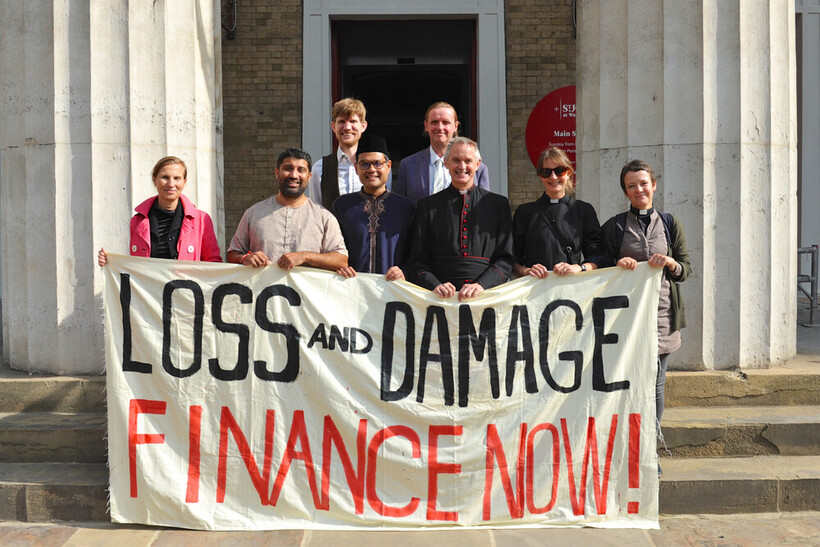Time to fill the bucket: the COP27 outcome on loss and damage
After years of campaigning, COP27 agreed a loss and damage fund. Olivia Hanks outlines what needs to happen now.

I spent an anxious Saturday afternoon in November watching for updates as the news began to filter through. Late that night, it was confirmed as COP27 closed: parties had reached an agreement that would see a loss and damage fund established.
It's important not to understate the significance of this win, and what it represents. Pacific island nations and other countries vulnerable to climate change have spent more than 30 years calling for compensation for the damage done to them by the rich world's emissions. Over the last decade, the issue of loss and damage had begun to gain some acknowledgement within the COP process, but it was always treated as a fringe issue, an afterthought – and the question of finance remained untouchable.
Prioritising loss and damage
COP26 in 2021 saw a shift. Civil society groups from the UK and elsewhere – including Quakers around Britain – relentlessly lobbied the UK Presidency to prioritise loss and damage and make sure finance had a place on the negotiation agenda. During the talks, we kept the issue at the forefront of delegates' minds through public actions, while advocates inside the official zone urged them to support a new fund.
We didn't get the outcome we wanted in Glasgow: the proposal from the G77 countries and China (representing 85% of the world's population) for a finance facility was blocked. But the buzz around loss and damage continued into 2022: many more people in politics and the media now knew what the term meant, and what global south countries and campaigners were calling for.
Loss and damage continued to rise up the political agenda in 2022 thanks to the powerful leadership of Pakistan senator Sherry Rehman as chair of the G77 in the wake of the devastating floods in Pakistan this summer – and this time, the global north media was primed to pick up on it. In the weeks leading up to COP27, headlines billed loss and damage as the key issue for the talks.
COP27 negotiations
Despite all this, a tangible outcome on loss and damage finance still looked unlikely, with wealthy countries like the US, the UK and Australia continuing to argue that existing mechanisms were sufficient to address the issue.
The breakthrough came late in the negotiations: faced with the threat of a COP with no agreed outcome, the EU dropped its opposition and agreed to back a new fund. Where at previous COPs rich countries have repeatedly picked off and divided 'developing' countries, this time it was the 'developed' countries being divided while the global south stood its ground. And it worked: the US and other blockers followed the EU's lead and the fund was approved.
Filling the bucket
Much remains to be done. The details of how the fund will operate are to be worked out by a committee over the course of next year and, crucially, the actual money is yet to be found. As Mohamed Adow, director of PowerShift Africa put it:
What we have is an empty bucket. Now we need to fill it so that support can flow to the most impacted people suffering right now at the hands of the climate crisis.
— Mohamed Adow (@mohadow) November 20, 2022
Work is now needed to ensure wealthy countries come up with the money – and that it comes from the richest and the biggest polluters, not from poorer people in those countries. Quakers in Britain will continue our work with Make Polluters Pay, building public pressure for the UK to commit money for loss and damage and exploring where that money could come from.
The creation of a fund gives us a much stronger base from which to advocate for finance, since there is now somewhere for it to go. We also hope to build connections with groups around the world who are campaigning on this issue.
Celebrating a campaign win
Much UK commentary has labelled COP27 a failure because of the alarming lack of progress on phasing out fossil fuels. But if we make this the whole story, we are once again relegating loss and damage to lower status and ignoring the voices of those for whom it is a present reality. Celebrating wins is an essential part of campaigning, and I am proud and glad to be celebrating this one with Friends.
The victory belongs to the campaigners and delegates from the global south who have worked for this for so long. However, it was – and remains – also necessary for rich countries to feel the pressure from their own citizens. Lavetanalagi Seru of the Pacific Islands Climate Action Network said that the win "was only possible as a result of the voices of civil society, youth and the global-wide movements that made it clear that we cannot wait for another year or two to set up this funding facility."
We will never know for sure how much influence the work of UK faith groups had, but we know Quakers were part of a movement that brought loss and damage finance to the forefront in Glasgow, helping to pave the way for the decision in Sharm El-Sheikh. And when the balance of power has shifted enough to ensure the heads of 'developed' nations don't have it all their own way, we know climate justice is one step closer to reality.


